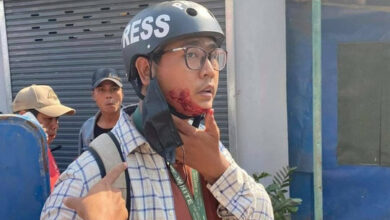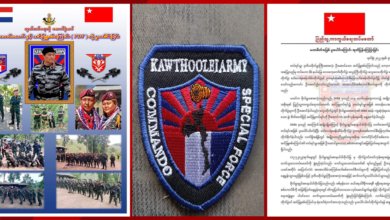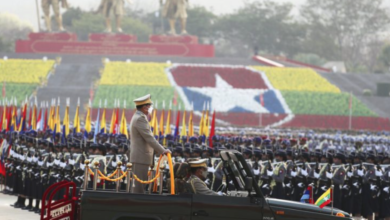Danger: Burma is without a national landmine action program

The new Burmese government needs to design and implement a national program to eliminate the landmine risk if it is serious about genuine political reconciliation with the ethnic minorities in Burma.
Despite democratic reforms and moves to sign ceasefires with non-state armed groups, Burma is still not a signatory to the 1997 Ottawa Convention banning the use of land mines, and no substantial moves have been made on demining in conflict zones along its borders. Without a timeline and genuine political dialogue between the government and the ethnic minorities, the safety of villagers and displaced people continues to be threatened, and it is too dangerous for refugees to return.
Although the government claims it is no longer using antipersonnel mines in conflict-affected areas, a new report by the International Campaign to Ban Landmines (ICBL) alleges both the Burmese military and non-state armed groups are still employing these weapons. The latest report produced by the ICBL states that landmine use in Burma has decreased over the years; there are fewer incidents of new antipersonnel mine use, and what use does occur is in more limited geographic areas. As of 2011 there were several reports of landmines still being used, including by government forces, border guard forces, and non-state armed groups, including the Karen National Liberation Army (KNLA). The ICBL reports that there were over 381 documented landmine casualties in 2011, although the actual number is likely to be much higher.
Although the government in Burma has stated it is willing to ban land mine use as part of ceasefire agreements with the armed groups, there has been no formal halt in their use by either side. Burma has not yet acceded to the 1997 Ottawa Convention, or the Mine Ban Treaty. The national government has participated in treaty meetings, and in 2012 the Minister of Foreign Affairs U Wunna Muang said it was considering joining as part of the country’s democratic reforms. As it stands, there is no national mine action program. However, the government has engaged with local and international organisations to develop one. In addition, there are several contractors hopeful of getting the approval to conduct surveys and begin clearance.
A major problem, however, is that no comprehensive action plan for the total elimination of these weapons can be properly designed or implemented until the central government and the ethnic groups feel that a genuine political process for long-term peace is underway. Until the Karen leadership feel that the Burmese government is serious about achieving long-last peace in Burma, and conflict stops, there will be very little authorities can do.
Speaking to Karen News, a researcher at the Landmine and Cluster Munition Monitor (the authors of the report), Yeshua Mongsir Pongsuwan, explained that despite the lack of a political conclusion armed groups should stop laying landmines.
“Clearly the ethnic armed groups will not allow any mine clearance in the areas they control until they feel confident that a political process that addresses the armed conflict is in place. And so it would be good if the ethnic armed groups made unilateral announcements that they won’t lay any new mines during this period of time when there is discussions about peace. I believe this is something they can do. At this point in time it would be a good confidence-building measure”.
The effects of landmines are not just serious bodily mutilation. They cause long-term social, political, economic, and psychological damage as well. They unnecessarily make villagers a part of the conflict between Burma’s army and the armed groups. Injury from a landmine only aggravates existing problems of villagers with limited income in accessing medical care. There are health services, but these are very expensive. And it is difficult to get treatment for a fresh injury across the border in Thailand. The security situation means it is difficult to cross the border unless through a major roadway. This is because many landmine injuries do not occur near major roadways, but rather in forest areas.
A family member injured by a landmine means one less person who is able to support that family. Primarily agrarian societies rely heavily on available manpower to support the local economy and produce food. In addition, if a landmine explodes on a farm, villagers will avoid that area. The land becomes unusable and communities are not able to grow as much food both for consumption and profit. This only worsens the ability of fragile and war-torn societies to develop economically, and puts Burma’s ethnic groups at a greater disadvantage than other parts of the country.
Apart from the more obvious economic and social damages, landmines also have a psychological impact. A study published by Human Rights Watch in 1993, written by Physicians for Human Rights, reported that landmine victims in conflict areas of Europe and Asia were strongly stigmatized as individuals who consumed, but produced nothing for their community. While there is medical care available to those who can afford it in Burma, according to Landmine Monitor’s Yeshua Mongsir Pongsuwan, there is a serious lack of both vocational and rehabilitation training for the disabled, including those maimed by land mines, and this limits their chances for employment.
A nation-wide mine elimination program in Burma would contribute to fostering the perception amongst ethnic minorities that the central government wants genuine political and social reconciliation.
*Christine M. Leah is a research analyst on military and strategic issues in Asia and Saw Wei Thoo is a Karen News journalist and producer.




